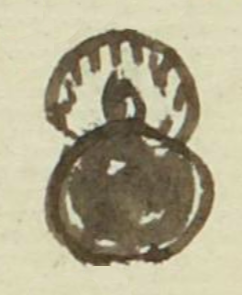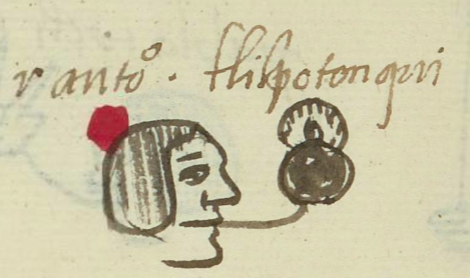Tlilpotonqui (MH563v)
This black-line drawing of the compound glyph for the personal name Tlilpotonqui (“Sticky-Stinky Black Feather Ritual Device,” attested here as a man’s name) shows a round white down feather and below that a black ball that could be potonqui (sticky and stinky, possibly like rubber--compare the glyph for olli, rubber, below). The potonqui was probably used to attach the feathers to the ritual device.
Stephanie Wood
Magnus Pharao Hansen wrote this when trying to translate Tlilpotonqui (which he found in the Morelos census of 1544): "'he stinks black'?". [See his blog.) That translation could work literally, but the ritual dimension seems important for clarifying that the reference is probably not to bodily odor. Tlilpotonqui was a priestly name that some say refers to black dust or a black stinky substance, apparently involving an adornment (perhaps a staff) that was glued with black feathers. See below for other examples. The name was held by some illustrious figures, including Quetzalcoatl and Miguel Tlilpotonqui, son of Tlacaelel and grandson of Huitzilihuitl. Tlilpotonqui could also refer to a child born outside of marriage. See the Online Nahuatl Dictionary for more information.
Stephanie Wood
anto tlilpotongui
Antonio Tlilpotonqui
Stephanie Wood
1560
Jeff Haskett-Wood
black, negro, feathers, plumas, regalia, devices, nombres de hombres

tlilpotonqui, a personal name, a title, a priest who wore a feather adornment, or a rare bean, https://nahuatl.wired-humanities.org/content/tlilpotonqui
tlil(li), black color, soot, ink,, https://nahuatl.wired-humanities.org/content/tlilli
potonqui, dusty or stinky, https://nahuatl.wired-humanities.org/content/potonqui
potoni, dust, https://nahuatl.wired-humanities.org/content/potonqui
(objeto ritual de plumas negras apestosas)
Manuel Orozco y Berra, Historia antigua y de la conquista de México (1960, 403).
Matrícula de Huexotzinco, folio 563v, https://www.loc.gov/resource/gdcwdl.wdl_15282/?sp=206&st=image
This manuscript is hosted by the Library of Congress and the World Digital Library; used here with the Creative Commons, “Attribution-NonCommercial-ShareAlike 3.0 License” (CC-BY-NC-SAq 3.0).











